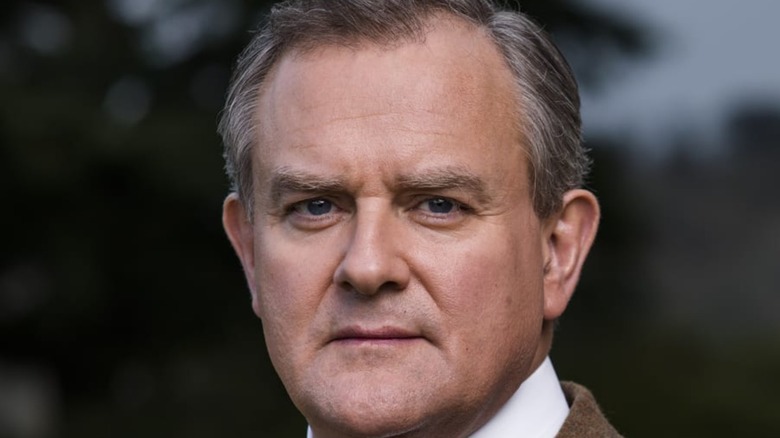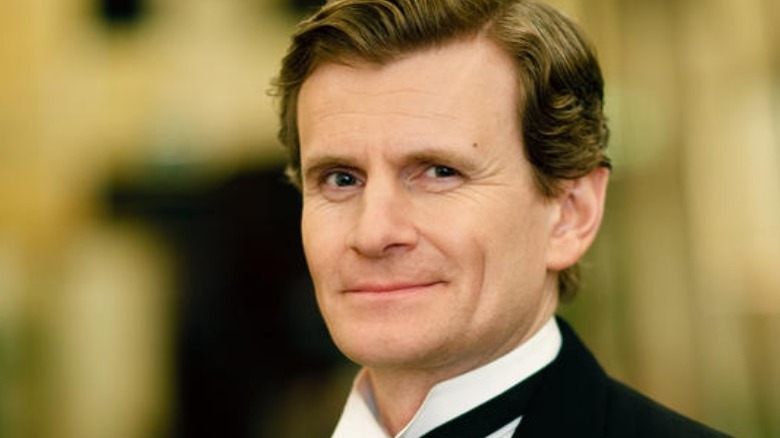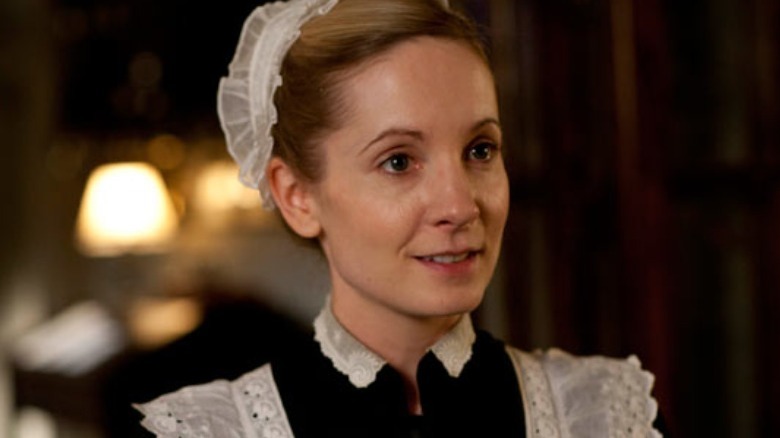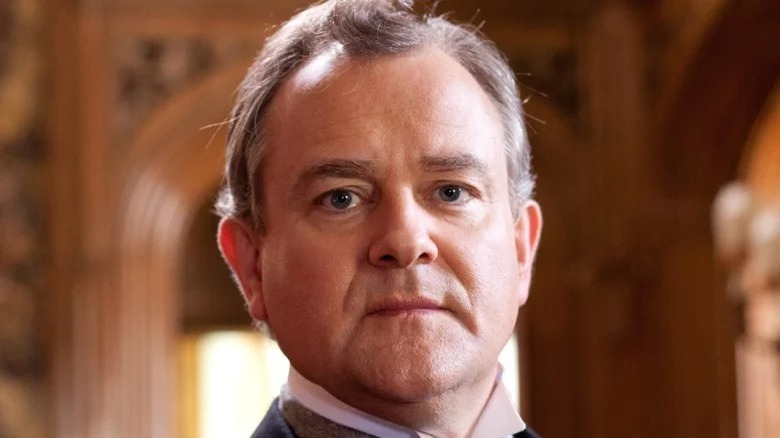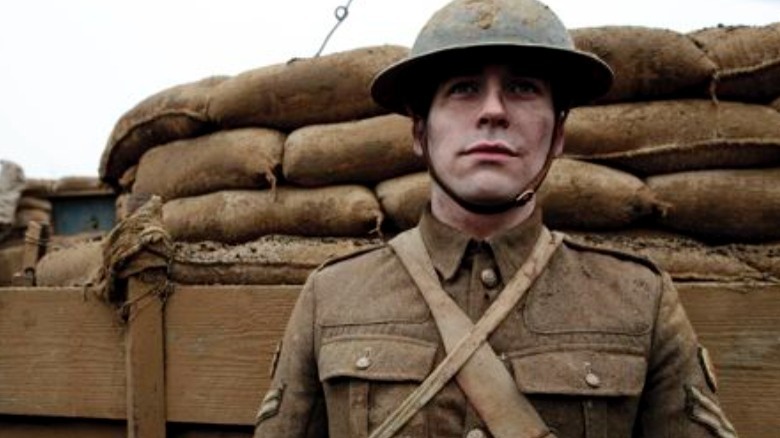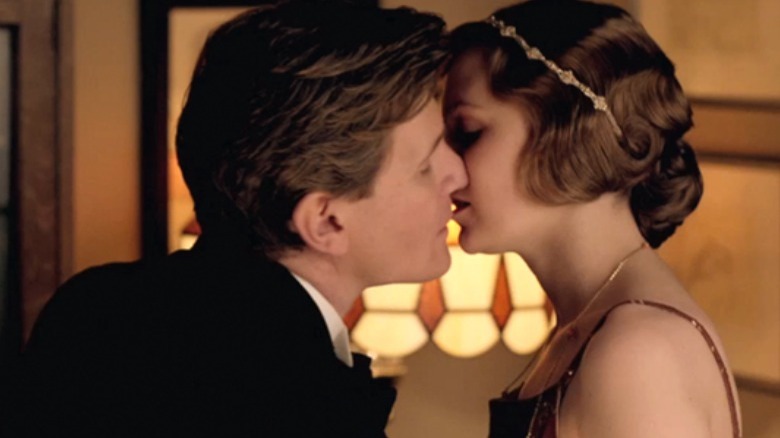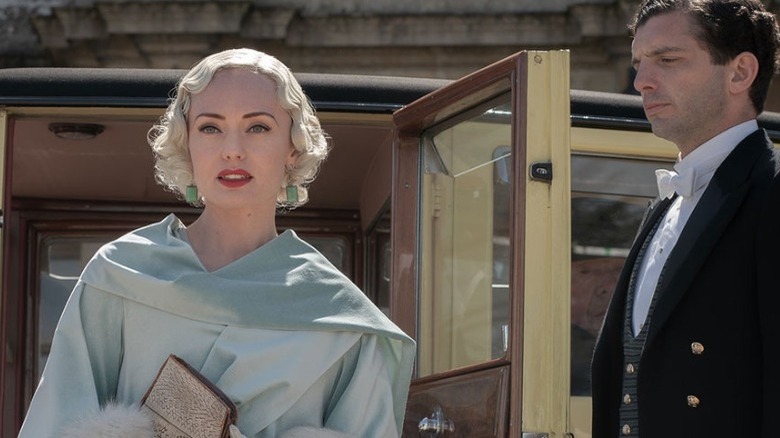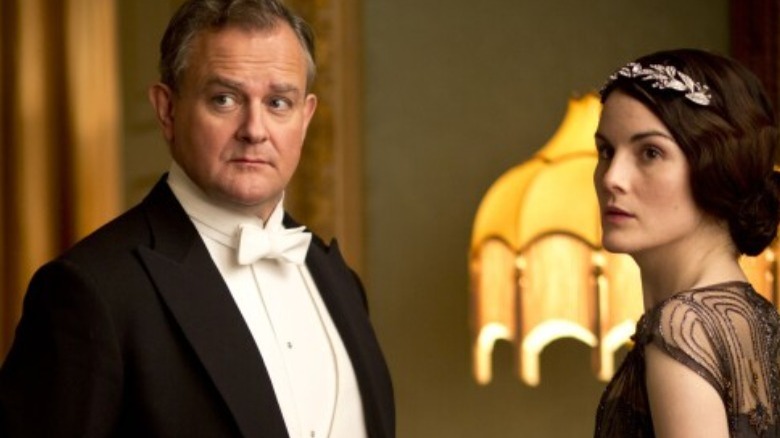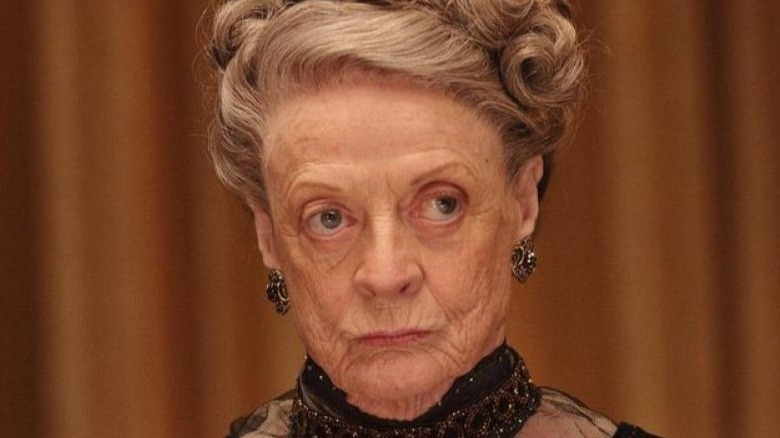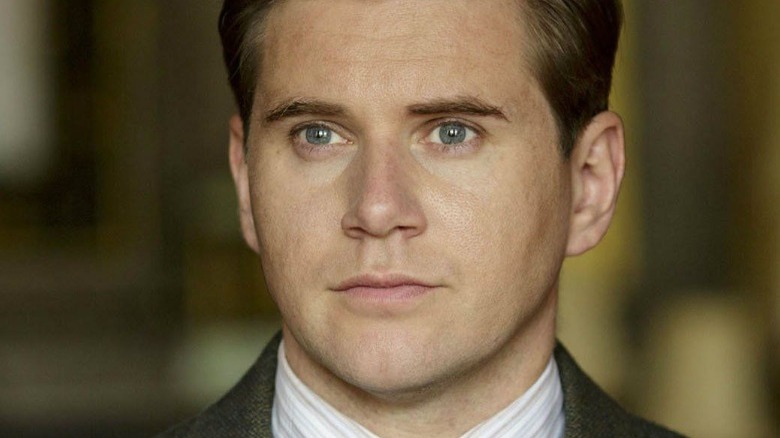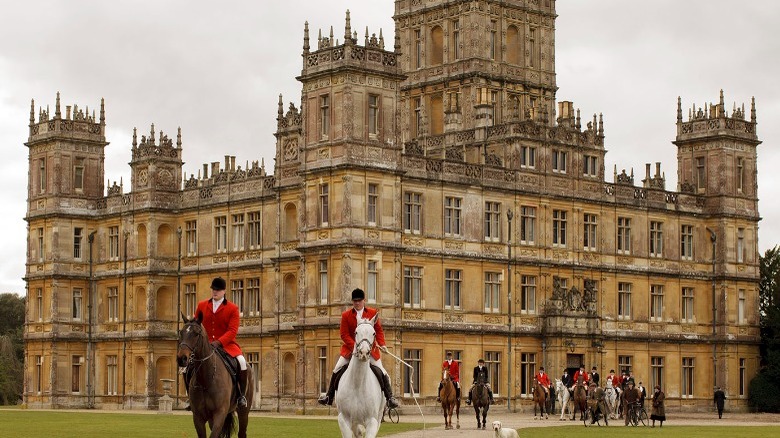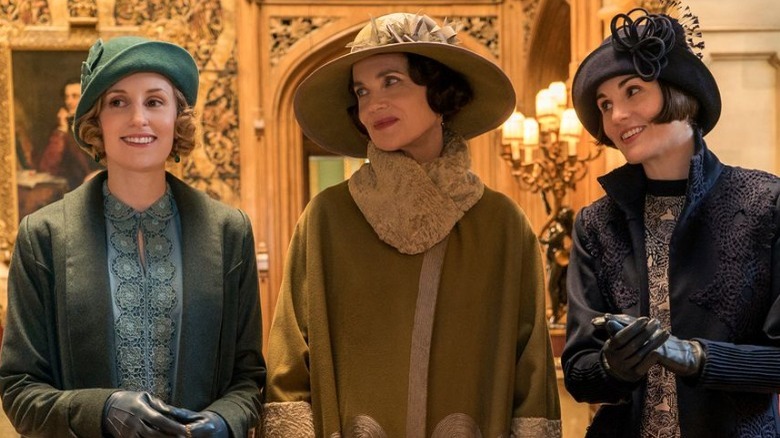Questionable Things We Ignore In Downton Abbey
From the time that "Downton Abbey" first burst onto screens in 2010 to the end of the series in 2015, it was one of the most popular television shows around the world. Airing on ITV in the United Kingdom and PBS in the United States, it quickly found success, growing a large and dedicated set of fans on both sides of the pond. The story of the Yorkshire estate and those that lived or worked there was watched by millions every week across its six seasons.
With the show receiving widespread critical acclaim and winning dozens of awards, there's little surprise that the creators decided to release a film in 2019 to continue the story. With a second movie titled "Downton Abbey: A New Era" set to release later this year, it's clear that there are still plenty of fans that want to see more of the historical drama.
Despite all of that, "Downton Abbey" was not perfect in every sense. The series has had some very contentious moments that most viewers simply didn't pay any attention to. Some are little issues while others pose bigger problems for the show and its cast and crew. If you look close enough, you'll see that there are lots of questionable things in "Downton Abbey" that we ignore while watching it.
Michael Gregson's disappearance and sudden death
Michael Gregson (Charles Edwards) is the editor for The Sketch in "Downton Abbey," a society magazine that publishes a letter from Lady Edith (Laura Carmichael). The article supporting women's rights caught his attention and he offered her a job writing a column. The pair quickly formed a strong relationship and later became lovers, although they never had a particularly easy time.
In Season 4, he goes to Germany in an attempt to divorce his wife so he can marry Edith, but goes missing while in Munich. He misses the birth of his child Marigold (Eva and Karina Samms) and is never seen in England again. Several investigations find no evidence of what happened to him, although there are suggestions that he was somehow involved in the Beer Hall Putsch and killed by Adolf Hitler's men.
The real reason for Gregson's disappearance may have been that his actor was involved in other projects. He had the lead role in the play "The King's Speech" throughout 2012. But it made little sense in the universe of "Downton Abbey" to have such an important character hastily exit.
The constant class inequality not being depicted properly
The Yorkshire country estate that is the setting of "Downton Abbey" might look idyllic at first glance, but it, and many other places like it, acted as a prime example of the class system of the UK in action. The post-Edwardian era in the early 1900s was a time when the aristocracy still ruled the land and had dozens of domestic servants at their beck and call. Yet, you wouldn't know just how bad the lower classes had it from the show. Going from the television series, it seems as if the servants of Downton Abbey are more than happy with their lives. The lords and ladies are, at least for the most part, perfectly reasonable and caring of their employees.
Of course, this is not exactly how reality was in those days and the servants would have had a much harder time while working. They would have little time to clean themselves and their duties would require all the hours of the day to complete. The aristocracy would also be insulting and unkind to those on the bottom rung of society, kicking servants out of estates at the slightest suspicion of any scandal. While this wouldn't make for great television and lead to much darker storylines, "Downton Abbey" paints a picture that simply never existed.
Robert Crawley is a terrible protagonist
Although "Downton Abbey" doesn't have a single protagonist in the traditional sense, Robert Crawley (Hugh Bonneville) could be seen as the main character. The 7th Earl of Grantham is the lord of the estate and takes it upon himself to protect it above all else. He is a deeply traditional man, avoiding modern technology and the wave of progression sweeping across Europe. That's not necessarily a bad thing by itself but the character has few redeeming qualities and proves to be a pretty terrible individual throughout the series.
As a person, Crawley is overbearing and believes strongly in his own self-importance. Regularly talking down to the women in his life, he values the estate of Downton Abbey and his family name over his actual family members. He practically forced his daughter Mary (Michelle Dockery) to marry Matthew Crawley (Dan Stevens) and only wed his wife Cora (Elizabeth McGovern) as a way of securing his own fortune, as she came from a wealthy background. Later on, he has an affair with a housemaid called Jane (Clare Calbraith) suffering no consequences as a result, and then falls for a number of schemes that end up losing almost all of the family's cash. When others suggest solutions or try to take control, the lord shows only contempt.
The vast time skips during World War I and elsewhere
Like many television shows, "Downton Abbey" had a choice to make about how it would organize its timeline. Shows like "Breaking Bad" have events lasting just a few months spread out over multiple seasons. Meanwhile, others stick to a single year for every season that airs. The historical drama takes a very different approach. The six seasons of the show take place across 14 years, stretching from 1912 to 1926.
For some, this might not be a major problem, although it does pose some issues for viewers. The first three seasons see everything from the sinking of the Titanic to the start and end of first World War across eight years. The most important complication is that it creates an unbelievable timeline that strains credulity. With years often passing in just a few episodes, it makes storylines seem like they are moving at a snail's pace, with almost no character development.
All of this means that "Downton Abbey" struggles to have any meaningful impact when it comes to plots and relationships, with everything stretched out in a way so that it appears that nothing ever really happens at the country estate in a timely manner.
All of the constant affairs and love stories
Every good television show has some sort of romantic element, with characters falling in love and fighting to keep their relationships going. "Downton Abbey" takes this to the extreme, though, with a vast amount of love stories. In fact, it can be difficult to keep up with the various plots with all of the characters, especially when many of the stories are so similar, featuring the maids and footmen working at the country estate and the lords and ladies they serve under. Everything started to feel very familiar after a couple of seasons and lost any sense of drama.
Even worse is that there are simply so many affairs happening in "Downton Abbey." There's barely a character in the show that hasn't cheated on a partner or been involved in an illicit or scandalous relationship at some point. Everyone from the Duke of Crowborough (Charlie Cox) to Ethel Parks (Amy Nuttall) had an affair at some point or other, while Robert Crawley had his own fling. The sheer number of affairs is beyond belief but so is the fact that nobody ever seems to suffer any lasting consequences from the affairs, with the likes of Crawley facing no repercussions for his actions.
The fact the characters use inaccurate language
Although the language used in "Downton Abbey” is English and essentially the same as used in the modern day, there are some notable differences. As society moves forward, language changes, with words and phrases taking on new meanings. Unfortunately, the writers of the show have included many modern anachronisms, with characters saying things that were simply not part of people's vernacular in the early 1900s.
One prime example of this was "que será, será" — a phrase that only became popular in 1956 when American singer and actress Doris Day performed her famous song featuring the same phrase. Others include "couldn't care less," "step on it," and "shafted," all of which are slang terms or sayings that were not regularly used in the English language until much later. The vast majority didn't become popular until decades later.
Babbel's Ted Mantele explained that "much of the speech and language used in 'Downton Abbey' is historically inaccurate" and "as time passes, the English language changes for various reasons." He went on to argue that the modern phrases and slang in "Downton Abbey" may be a result of the writers trying to make the show easier to understand. If characters used words that had different or confusing meanings in the early 1900s, this would make it difficult for modern viewers to know exactly what was meant.
Most of the men don't want any change
Anyone who has watched Downton Abbey will know there was something of a conflict between the progressives and traditionalists running throughout the series. Some people wanted to stick steadfastly to the old way of doing things while others were campaigning for a better and fairer life for everyone. However, the series glossed over this struggle for the most part, simplifying it down to the extent that the real reasons behind the two opposing arguments are lost
You'd be forgiven for thinking that the more conservative characters were simply grumpy old men who were stuck in their ways or scared of new technologies that were unlike anything they had ever seen before. This meant change happened very slowly in "Downton Abbey," just as it did in the real world at that time. But the reality was that the aristocracy opposed meaningful advancement of women's and workers' rights, social mobility, and general equality because they were afraid of losing their power.
They not only felt that they were justly at the top of society, but the lords and ladies also did their very best to argue that case to everyone else. The likes of Robert Crawley would argue that it was part of a moral society to have some ruling over others in this way, something that was never really touched upon in the show.
The characters never age properly
This point ties in with the rather bizarre timeline that "Downton Abbey" has. As mentioned previously, the show takes place over many years. Add in the movie, and almost two decades pass between the first episode and the film. Yet despite this rather lengthy passage of time, none of the characters age all that much, looking basically the same as they did from their original appearance. That's obviously because the series was filmed over just six years, though it's still quite jarring for viewers to see their favorite characters looking the same through major events from world history.
The biggest issue comes with the children in "Downton Abbey," who are seemingly stuck in some sort of ageless state. There are other notable instances as well, such as the Dowager Countess Violet Crawley (Maggie Smith). On an episode of the British chat show The Graham Norton Show, Smith even pointed out the confusing nature of her character's age saying "by the time I finished, she must have been 110." She added that "it couldn't go on and on and on... It didn't make sense."
The unrealistic storylines
As you might expect from a television show, there is plenty of drama in "Downton Abbey" and things that are out of the ordinary seem to happen quite a lot. Of course, this makes some sense as it wouldn't make for great entertainment to watch a group of people go about their normal mundane lives. However, the historical drama has a tendency to overdo the storylines that it regularly features, to such an extent that many of them are completely unrealistic and even verge on the unbelievable.
Perhaps the biggest mistake in this regard came in the relationship between the servants and their employers. Lord Grantham and his family would never be as close to the likes of Charles Carson (Jim Carter) and Elsie Carson (Phyllis Logan) as they were portrayed. Things like a maid giving birth in Lady Mary's bedroom and the acceptance of Lady Sybil's (Jessica Brown Findlay) marriage to the chauffeur Tom Branson (Allen Leech) would never have been tolerated by the aristocracy, who would get rid of servants for the slightest infraction or rumor of a scandal.
It avoids all mention of the slave trade
The aristocracy in the United Kingdom, and elsewhere in Europe, made their money in a variety of ways and not all of them were particularly wholesome. Arguably the worst was the slave trade, which contributed to the wealth of many members of the upper classes in Britain. Some even argue that estates such as Downton Abbey were only able to be funded through the proceeds of slavery.
Until slavery was abolished in the UK, the lords and ladies of the land made large sums of money in the trade. Even after it was banned, the aristocracy was still paid handsomely for its involvement. The UK government used almost half of its annual budget in 1833 to buy the freedom of slaves, a figure that was so large it was still being paid in 2015. These connections to slavery were never mentioned in "Downton Abbey," despite the fact it takes place less than a century later and almost every stately home would have been involved.
A lack of historical accuracy
"Downton Abbey" is not a very historically accurate show. Some viewers have noticed things that are out of place, such as television antennas, pictures of the Queen, and even plastic water bottles being included in scenes. Some of the costumes are incorrect as well, with outfits not matching the clothing that would be worn at that time.
It isn't just little mistakes, either. Quite a lot of the major storylines or themes in "Downton Abbey" don't make sense for the time period. One example of this is the fact that the Crawley family — at least the women — are too innovative and advanced. Most aristocratic families at that time would not be as progressive. Storylines, such as the one where Irish nationalists attempt to kill King George V, never actually happened. Meanwhile, the show doesn't properly represent the effects and consequences of the Spanish Flu pandemic, which killed hundreds of thousands of people in England.
There's also a big issue when it comes to the servants. Generally, those working downstairs in estates like Downton Abbey would be constantly dirty and have little access to clean clothing or water to wash properly. According to historian Jennifer Newby, servants would stink and be filthy. Their relationship with those upstairs would be different as well, with the lords and ladies taking little interest in them and rarely talking with them unless necessary.
